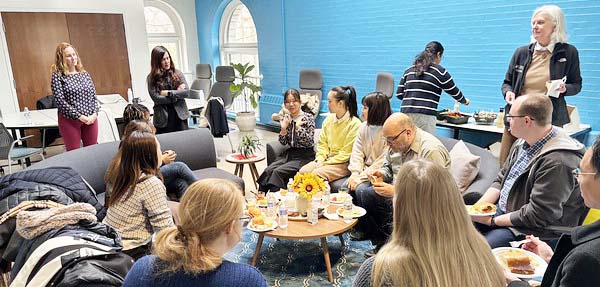The TOMODACHI-STEM Women’s Leadership and Research Program is a five-week internship experience led by Lehigh and Rice University in Houston, Texas, for female undergraduates from Japan majoring in science and engineering.
According to the program’s website, the program aims to engage female Japanese students in STEM and encourage them to pursue graduate study and future research opportunities.
For Dylan Shropshire, a biological sciences professor and host professor, the TOMODACHI-STEM program is invaluable because of the diversity it brings to science.
“Diversity really matters in science,” Shropshire said. “Broadly across STEM fields, men tend to outnumber females at the faculty level, so we need to create more female scientists that can take over more of those jobs to make a more diverse faculty body.”
The 2024 cycle of the program began on Feb. 10 with a cohort of 10 students — five based at Lehigh and five based at Rice. The cycle will conclude on March 13.
For the first four weeks of the program, the students join a research lab at their respective institutions under the mentorship of a professor or graduate student. For the final week of the program, the cohort reunites at Rice to present their final projects and receive tours of NASA and Dow Chemical Company.
Stacy Burger, the director of global partnerships and strategic initiatives at Lehigh, said in Japan, it is less common to have women in STEM fields, especially compared to the student body at Lehigh. TOMODACHI-STEM allows for the program participants to be exposed to that.
“When we look at the student body of Lehigh, many women are involved in STEM fields,” Burger said. “So, allowing these (Japanese) women to be exposed to Lehigh women (in STEM) who are incredibly bright and engaged in all kinds of activities shows them that they too can be that successful and have these opportunities.”
Kaede Yoshida, a second-year student at Waseda University in Japan, is majoring in bioscience. With her interest in microbiome relationships overlapping with Shropshire’s research in host-microbe interactions, it made perfect sense for her to join his lab.
Yoshida chose to apply to TOMODACHI-STEM as she is considering pursuing her master’s or doctorate degree at an overseas university. She wanted to gain her first experience working in a research lab and compare Japanese and U.S. labs.
“At universities in Japan, undergraduate students normally are not affiliated with a lab until their senior year, and that’s too late,” Yoshida said. “I want to join a lab now and have those experiences in my second year.”
The program works with the United States Japan Council (USJC), and Lehigh and Rice recruit through marketing efforts that begin in the summer. The USJC sends the application to numerous Japanese organizations and institutions with STEM programs.
Burger said the application process is rigorous due to its written application and multiple interviews, all of which are conducted in English.
The application opens in July and ends in September when the cohort for the cycle is chosen. Once the cohort is selected, an online orientation runs in November before the students arrive in the U.S. at their campus.
At Lehigh, due to housing restraints, the TOMODACHI-STEM students stay at the off-campus Comfort Suites and work at their respective labs every day of the week.
With her current role, Burger said she has limited interaction with students. However, due to the program’s small size, she has been able to stay very hands on.
For Burger, part of the reason she pursued higher education was to work with students between the ages of 18 and 24. She said at this age, there is so much potential and so much excitement about the unknown and students’ futures. She loves to be a part of that, even if only for a month.
Burger said it’s important for her to combine that passion with her work with international students toward fostering intercultural competency throughout Lehigh.
“There are so many benefits of having international students on our campus,” Burger said. “It’s getting exposure, not only for the Lehigh students, but also for the Japanese students, to interact with different cultures, and building our own intercultural competencies is something that everyone should be doing.”
Ethan Yang, a civil and environmental engineering professor, first became involved in the program as a host professor and is now the faculty advisor.
As faculty advisor, Yang works with all five students based at Lehigh. The program participants are asked to write weekly journals about what they are working on in the lab, any challenges or difficulties and their general experience. Yang offers comments and suggestions, and helps in any way he can, especially when it comes to research questions or standstills.
Yang chose to get involved in the TOMODACHI-STEM program because of the importance of international collaboration.
“I always welcome international collaborations,” Yang said. “I also want to share that passion with my own graduate students. They should learn how to be colleagues and be friends with people from other countries or from other cultures.”
As a new faculty member, having joined Lehigh in August 2023, Shropshire was excited to participate in a program like TOMODACHI-STEM.
Both of Shropshire’s graduate students are international, from Kenya and Belgium. He felt he was already privy to the benefits of having a diverse range of people in his lab. Becoming a host professor seemed like an excellent opportunity to further that.
“Science is built on the back of creativity and if you have diverse perspectives, then you’re going to be more creative,” Shropshire said. “You’re going to be able to make significant strides.”






Comment policy
Comments posted to The Brown and White website are reviewed by a moderator before being approved. Incendiary speech or harassing language, including comments targeted at individuals, may be deemed unacceptable and not published. Spam and other soliciting will also be declined.
The Brown and White also reserves the right to not publish entirely anonymous comments.